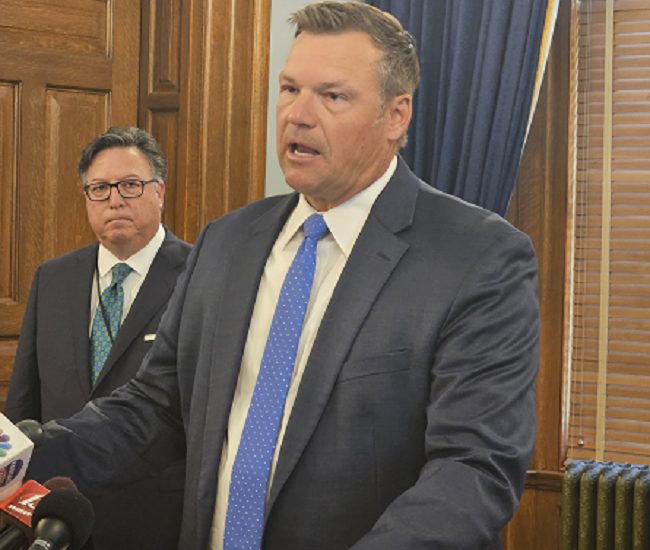A new state law addressing transgender Kansans requires Gov. Laura Kelly’s administration to restore any driver’s licenses and birth certificates that were modified to reflect someone’s gender identity, the attorney general said Monday.
Addressing the media at the Capitol on Monday, Kris Kobach delivered a six-page advisory opinion on a new law known as the Women’s Bill of Rights that establishes that an individual’s sex means their biological sex – either male or female – at birth.
The opinion came less than 72 hours after Kobach went to court to get a judge to dissolve a consent decree so it would keep transgender people from correcting their gender marker on their birth certificates.
Kobach’s office argued in a federal court filing that it’s impossible to enforce that consent order after the Legislature enacted a law establishing that an individual’s sex means their biological sex at birth.
The new law – known as SB 180 – requires any state agency, school district or local government that collects vital statistics for public health, crime and economics or other topics to identify each individual as either a male or female at birth.
The new law also allows distinctions to be made between the sexes with respect to athletics, prisons or other detention facilities, domestic violence shelters, rape crisis centers, locker rooms and restrooms.
Kelly vetoed the bill but was eventually overridden by the Legislature, 84-40 in the House and 28-12 in the Senate.
Kobach’s nonbinding opinion only addressed driver’s licenses, birth certificates and the housing of females at the Topeka Correctional Facility.
It does not address the question of bathrooms, although Kobach said he believes the law doesn’t provide a path to bring a legal challenge over how bathrooms are maintained.
“SB 180 does not empower any private individual to bring litigation against any other individual or against any school because of the way that organization or school maintains their bathrooms,” he said.
“It does give the school a defense if it is challenged, but it doesn’t create a private right of action,” he said.
Kobach said the new law requires the state to change its driver’s license database to reflect someone’s biological sex at birth if the document was already changed to reflect their gender identity.
The modified driver’s license wouldn’t have to be surrendered, although any future license would show their biological sex at birth.
Likewise for a birth certificate, if the state health department has modified the document to list a sex other than someone’s biological sex at birth, the new law requires the paperwork to be restored to its original form, he said.
The current birth certificate would not have to be surrendered, although future documents would show their biological sex at birth, he said.
He also said that the law requires the Corrections Department to house only biological females together in a wing of the Topeka Correctional Facility.
“Our laws should reflect truth,” Kobach said. “And that is what SB 180 ensures, it reflects biological truth.
“A person is free to present themselves how they want, to dress how they want, to get whatever their operations they choose.
“But they are not able to change what their sex was at birth or their genetic code that reflects their sex at birth.”
Republican state Sen. Renee Erickson of Wichita, said the bill was about protecting the rights of women and girls.
“You can live and feel however you want, but we are doing this based on biological fact, which is what we need in order to run the state as a state business,” she said.
The American Civil Liberties Union of Kansas said Kobach’s opinion doesn’t carry a lot of legal weight.

“Courts have been more than willing to disregard attorney general opinions they don’t agree with, especially when the issuing office has failed to interpret the law in accordance with the basic standards of our constitution,” said Sharon Brett, legal director of the ACLU of Kansas.
“State statutes cannot override Kansans’ constitutional rights, and the courts — not attorneys general — are the final decision makers in that arena.”
Kobach said he was prepared to go to court to enforce the law if the Kelly administration didn’t adhere to the statute.
“Certainly, members of an administration may have policy preferences on this particular issue, but the Legislature has spoken,” Kobach said.
“The governor’s staff and the governor’s agencies cannot act as if the Legislature did not override her veto,” he said.
“They did override her veto so the law is what it clearly states,” he said.
“We expect the governor’s office and her agencies to conform to the law,” he said.
“She has a legal obligation to do so and we expect her to do so,” he said. “The governor cannot act as if SB 180 was not passed.”
The governor’s office didn’t respond to the opinion after it was released Monday afternoon but said earlier in the day that it objected to Kobach’s effort to modify the consent decree that the Kelly administration negotiated in 2019 shortly after taking office.
“While we have had discussions with the attorney general’s office regarding SB 180, we do not agree with their legal view and believe that the consent judgment was the appropriate resolution,” spokesperson Zach Fletcher said in an email Monday morning.
Meanwhile, the ACLU suggested that Kobach should be more deliberate in his approach.
“As he has done so many times in the past, Mr. Kobach was more than willing to rush in and impose his own stamp of extremism in an attempt to allow the state to deny Kansans their basic constitutional rights,” said Micah Kubic, executive director of the ACLU of Kansas.
“But should he decide to go further in an attempt to enforce his interpretation, the ACLU of Kansas remains ready to respond with the full force of our community and our legal team,” Kubic said in a statement.
Kubic noted that the statute lacks any explicit enforcement mechanism, making it difficult for people to understand how the law would be applied.
“SB 180 absolutely does not require any of the measures Attorney General Kobach has advised the Kansas Department of Revenue and the Kansas Department of Health and Environment – two executive branch agencies that are totally outside of Mr. Kobach’s control – to put in place,” Kubic said.
“These are of his own volition and interpretation, driven by his own extreme ideological perspective, not by requirements of the law, the constitution, or the best interests of Kansans,” Kubic said.
Douglas County District Attorney Suzanne Valdez has already said she will not prosecute anyone under the law that she believes is “senseless” and is “potentially dangerous to our trans community.”
Valdez made her comments as there is an effort to make Lawrence a sanctuary city for transgender and nonbinary people.
“As district attorney, I was deeply saddened when this law was passed,” Valdez said recently.
“In today’s chaotic world where we should treat one another with dignity, understanding and compassion, the Kansas Legislature chose to create a law that is senseless and, quite frankly, potentially dangerous to our trans community,” she said.
















